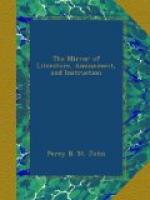Annette Martin was the daughter of a small farmer who resided about a mile and a half from the Castle; but, being the tenant of Lord Mortimer, had not only frequent occasion to go thither himself with the rural produce of his farm, (for which the Castle was a ready market,) but also to send Annette. Thus then commenced that innocent girl’s acquaintance with the Baron’s chief huntsman, not long after Elliott’s induction into that office, by the resignation of his superannuated predecessor.
Strange rumours were afloat respecting the conduct of Charles; none of which, it is to be presumed, met the Baron’s ears, or assuredly the deprivation of his office would have followed. But Lord Mortimer was a young man, paying his addresses to a lady who lived at some distance from the Castle, and consequently much absent from it. And, what said pretty Annette to the rumours which failed not to meet her ear, of her lover’s misconduct? “I don’t believe a word of them! Charles may be fonder of pleasure than of business, but he is a young man; by and by he will see and feel the necessity of steady application to the duties of his situation, and become less wild and more manly.” “Never!” would be solemnly enunciated by Annette’s auditors. “As to the charge,” would she undauntedly continue, “brought against him of cruelty to the dogs under his care, it is an abominable falsehood; Elliott may be passionate, I don’t say he is not, but he is generous and humane. I have never seen him scourge the hounds, as you tell me he does, until blood drops from their mangled hides; I have never heard the cries which, you say, resound from their kennels day and night; cries of pain and hunger.”
“And have you never seen,” would ask some well-meaning tale-bearer, “any of those poor brutes, whose wealed and mangled coats, proclaimed how savagely they had been treated?”
“I have indeed seen,” would answer Annette, “dogs lacerated by the wild boars with which the Castle forests abound.”
“And have you never observed the miserable skin-and-bone plight of my lord’s hounds?”
“They are not thinner, Charles says, than most hounds in good training: when dogs get fat, they become lazy, lose the faculty of finding game, and the inclination of bringing it down.”
“Dogs it is true, ought not to be pampered and surfeited, but they ought to be fed.” Upon this, Annette would vehemently maintain that fed they were, and amply, as she had seen Elliott cut up their meat; whilst the friendly newsmonger would charitably hint, that her intended knew as well as most men how to turn an honest penny, by cheating the dogs of their food, and selling it elsewhere.
Annette cared little for inuendos which she attributed chiefly to malice and ill-nature. None are so difficult to convince as those who are obstinately deaf to conviction, and there is an idolatry of affection which sometimes burns fonder and deeper, as its object is contemned and despised by the world. Annette had also some idea, that these, and other reports to the prejudice of Charles, originated with an unsuccessful rival, though poor William Curry, amiable, single-minded, and good-humoured as he was, never breathed in her presence, a syllable to the disparagement of Elliott.




